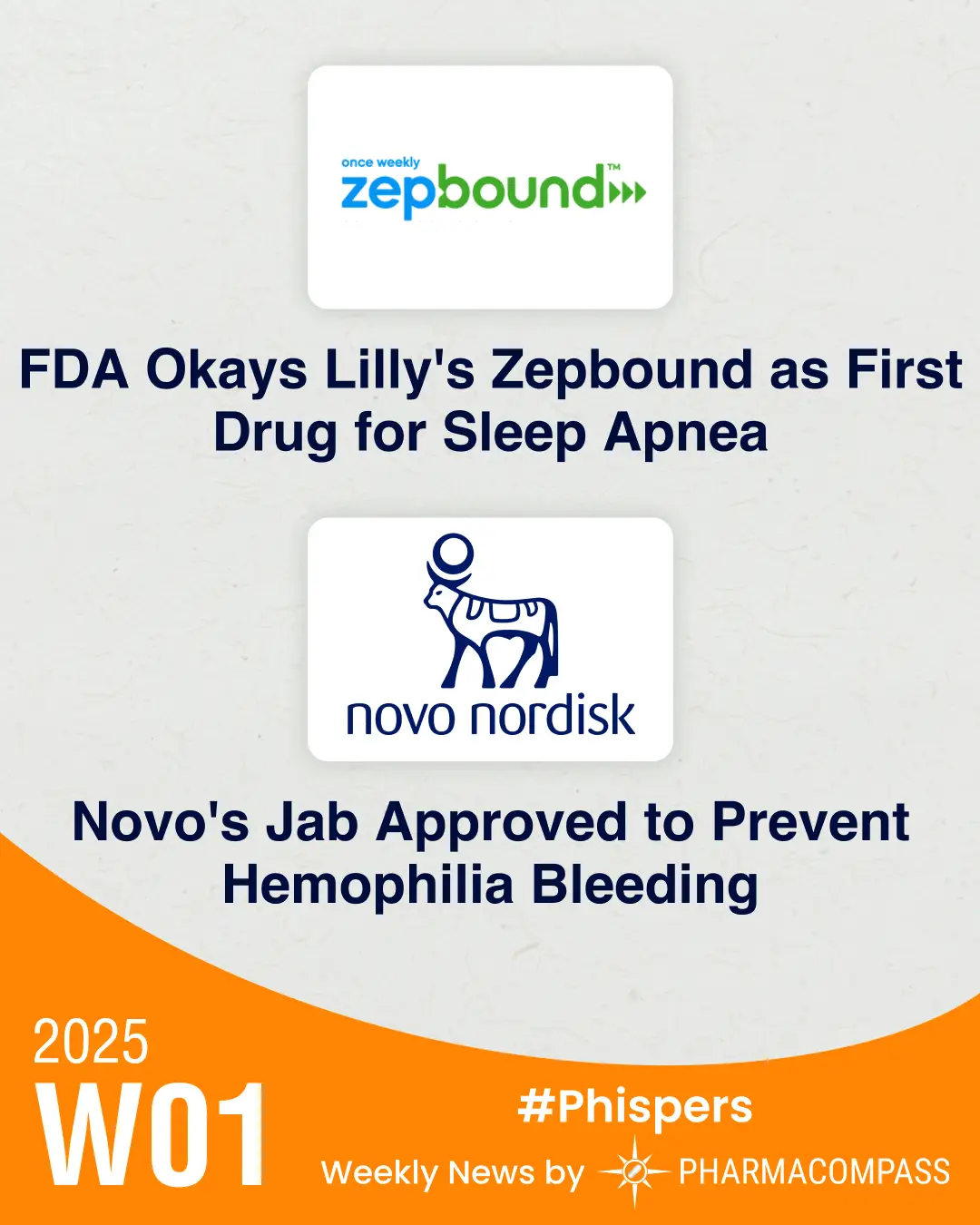
By PharmaCompass
2025-01-02
Impressions: 1,227 (Article) || 32 (Video)
This week’s Phispers is a double bill with news from the last two weeks. Through much of December, the US Food and Drug Administration (FDA) has been approving drugs at a renewed pace. The momentum picked up further as the year drew to a close.
Eli Lilly’s Zepbound broke new ground as the first FDA-approved treatment for obstructive sleep apnea (OSA) in adults with obesity. In the US, OSA affects around 39 million people, with obesity being a major contributing factor.
Novo Nordisk celebrated a hard-fought victory with the approval of Alhemo, a once-daily subcutaneous injection that significantly reduces bleeding episodes in hemophilia patients. FDA also approved Ionis Pharmaceuticals’ Tryngolza, the first treatment for familial chylomicronemia syndrome, a rare genetic disorder. This approval also signifies Ionis’ transition to a commercial-stage company.
Vertex Pharmaceuticals’ triple combination therapy for cystic fibrosis, a rare and progressive genetic disease, also received FDA’s nod. Bristol Myers Squibb won approval for Opdivo Qvantig, an injectable form of its blockbuster cancer drug, promising greater convenience to patients. Meanwhile, Merck announced positive results from two pivotal trials for its investigational HIV-1 treatment.
In negative news, Zealand Pharma faced a setback as the FDA declined to approve its bowel disease drug, glepaglutide, calling for an additional trial. And Viatris had to contend with FDA’s import restrictions on 11 products from its Indian facility due to significant violations of current good manufacturing practices (cGMPs).
Lilly’s weight-loss drug Zepbound breaks ground as first sleep apnea treatment
Eli Lilly’s weight-loss drug, Zepbound (tirzepatide), has received FDA approval as the first and only prescription medication for treating moderate-to-severe obstructive sleep apnea (OSA) in adults with obesity. This approval marks a significant milestone in the management of OSA, a condition that is often overlooked and misdiagnosed as mere snoring. During OSA, blocked upper airways cut off breathing, jolting people awake gasping for air. Excess weight can narrow the airway. In a late-stage study, patients on Zepbound experienced up to 25 fewer breathing interruptions per hour compared to those on placebo. Additionally, nearly half of the trial participants no longer exhibited symptoms of OSA after one year of treatment.
FDA approves Novo’s under-the-skin treatment to prevent hemophilia bleeding
FDA has granted approval to Novo Nordisk’s Alhemo (concizumab-mtci) injection, a once-daily prophylactic treatment designed to prevent or reduce the frequency of bleeding episodes in patients aged 12 and older with hemophilia A or B with inhibitors. This renders it the only subcutaneous option for patients who have developed antibodies against the clotting factor replacement treatments. It was a hard-fought win for Novo after FDA rejected the drug in 2023.
Merck’s HIV treatment succeeds in late-stage studies: Merck has announced positive results from two pivotal phase 3 trials for its investigational HIV-1 treatment regimen doravirine/islatravir. This is a two drug, once daily, single tablet regimen for adults with HIV-1 infection that is virologically suppressed on different antiretroviral therapy regimens.
First treatment for rare genetic disorder approved, marking Ionis’ commercial debut
FDA has approved Ionis Pharmaceuticals’ Tryngolza (olezarsen) as the first-ever treatment for adults with familial chylomicronemia syndrome (FCS), a rare genetic disorder that prevents the body from breaking down fats. Tryngolza is the company’s first wholly-owned drug to receive FDA approval. FCS is characterized by extremely high levels of triglycerides, which can lead to severe complications such as pancreatitis.
Tryngolza works by reducing triglyceride levels, thereby helping in the management of symptoms and risks associated with the disorder. This new treatment option is expected to significantly improve the quality of life for patients with FCS, who currently rely on strict dietary restrictions to manage their condition. Ionis plans to commercialize Tryngolza independently, marking a new era for the company as it transitions to a commercial-stage entity.
Vertex’s triple combo med for cystic fibrosis okayed: FDA has approved Vertex Pharmaceuticals’ med for cystic fibrosis, a rare and progressive genetic disease. This next-generation treatment is a once-daily triple combination therapy, branded Alyftrek (vanzacaftor/tezacaftor/deutivacaftor). It has been approved to treat patients aged six years and older.
FDA clears injectable version of BMS’ blockbuster cancer drug Opdivo
FDA has approved an injectable version of Bristol Myers Squibb’s cancer drug, Opdivo (nivolumab), co-formulated with hyaluronidase (Opdivo Qvantig), for subcutaneous use. This new formulation is designed to treat most previously approved adult solid tumor indications, either as monotherapy, maintenance therapy following combination treatment with Yervoy (ipilimumab), or in combination with chemotherapy.
Previously, Opdivo was administered through intravenous infusions, akin to other PD-1 inhibitors such as Merck’s Keytruda (pembrolizumab). This necessitated visits to a healthcare facility for treatment. The subcutaneous form of Opdivo is not inferior to the intravenous version in terms of efficacy and safety, a trial found. The new injectable form is anticipated to offer greater convenience to patients and may help protect the company from sales declines once the patent for the intravenous version expires later this decade.
FDA declines to approve Zealand’s bowel disease drug, calls for new trial
FDA has declined to approve Zealand Pharma’s glepaglutide to treat short bowel syndrome (SBS) with intestinal failure. The decision was communicated through a complete response letter (CRL), which indicated that the submitted data did not fully meet the requirements for demonstrating the drug’s efficacy and safety. SBS is a rare disorder that occurs when the small intestines are damaged or shortened.
The CRL recommended that Zealand conduct an additional clinical trial to provide further evidence supporting glepaglutide’s effectiveness and safety at the intended dose. The company plans to initiate a phase 3 trial this year, which will also support marketing authorization applications in other regions and provide additional confirmatory evidence for a regulatory resubmission in the US.
FDA restricts imports of 11 Viatris products over significant cGMP violations
FDA has issued a warning letter to Viatris regarding its manufacturing facility in Indore, India, resulting in the restriction of imports on 11 products made at the site. The inspection, conducted from June 14 to 26, 2024, identified significant violations of cGMP regulations. Key issues included inadequate written procedures for the quality control unit and unreliable quality control data.
However, due to potential shortages, the agency has made conditional exceptions for four products. Viatris has implemented a comprehensive remediation plan, including corrective and preventive actions, and has engaged independent third-party experts to support these efforts.
The PharmaCompass Newsletter – Sign Up, Stay Ahead
Feedback, help us to improve. Click here
Image Credit : Phisper Infographic by PharmaCompass license under CC BY 2.0
“ The article is based on the information available in public and which the author believes to be true. The author is not disseminating any information, which the author believes or knows, is confidential or in conflict with the privacy of any person. The views expressed or information supplied through this article is mere opinion and observation of the author. The author does not intend to defame, insult or, cause loss or damage to anyone, in any manner, through this article.”







